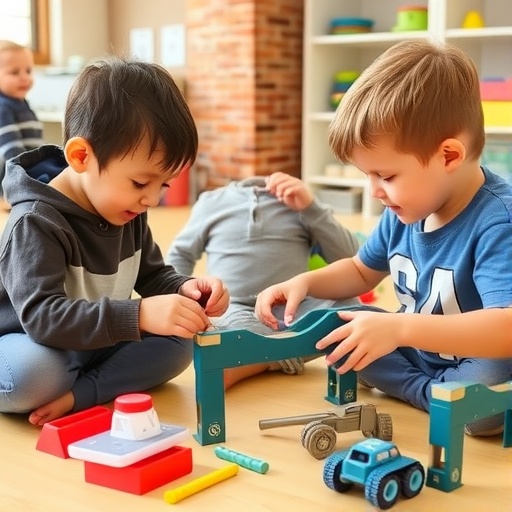In the ever-evolving landscape of early childhood education, the interplay between engineering principles and creative practices is gaining substantial recognition. The recently published research by Bridle, Donnelly, Padwick et al. sheds light on the experiences of engineers and creative practitioners as they collaborate to co-create engaging activities and resources aimed at children aged three to seven years. This pivotal study not only explores the dynamics of co-creation but also evaluates the effectiveness of the resources designed for educators, thus aiming to bridge the gap between theoretical engineering concepts and their practical application in early childhood settings.
The significance of this research can be understood in the context of a growing educational paradigm that emphasizes experiential learning among young children. By integrating engineering challenges into the curriculum, educators can cultivate critical thinking, problem-solving abilities, and creativity in their students. The authors’ collaborative approach underscores the importance of interdisciplinary partnerships, which can enrich educational experiences and foster a love for learning in the formative years of childhood.
At the heart of this research lies a series of carefully designed activities that engage children in engineering-related tasks. The authors outline how these activities not only stimulate cognitive development but also promote social interaction and teamwork among young learners. By incorporating hands-on projects that require collaboration, the research highlights the multifaceted benefits of experiential education, demonstrating that learning through play can effectively teach foundational skills that are crucial for future academic success.
Furthermore, the study places emphasis on the evaluation aspect, where educators provide feedback on the effectiveness of the resources implemented. This reflective practice allows for continuous improvement and adaptation of the co-created materials, ensuring they meet the diverse needs of young learners. By collecting and analyzing teacher evaluations, the research provides valuable insights into the practicalities of integrating engineering concepts into the early childhood curriculum, offering a model for future developments in this space.
Additionally, Bridle and her colleagues delve into the challenges faced by educators in accessing and applying engineering resources. The research identifies key obstacles, such as a lack of familiarity with engineering principles among early childhood educators and limited professional development opportunities. By addressing these barriers, the authors aim to advocate for a more supportive environment that empowers teachers to embrace innovative teaching methods that encompass engineering and creative practices.
The implications of such interdisciplinary collaboration extend beyond the classroom. By equipping young learners with a robust foundation in engineering principles, the research posits that children will develop skills that are increasingly vital in an ever-changing workforce. Educators are encouraged to consider the long-term benefits of instilling creative problem-solving skills in their students, which can lead to enhanced adaptability and resilience in the face of future challenges.
As the research unfolds, it becomes evident that the collaborative efforts of engineers and practitioners can drive significant change in early childhood education. The authors present compelling evidence that when these diverse perspectives are combined, the resulting educational experiences are not only more engaging but also more effective in nurturing a new generation of critical thinkers and innovators. This paradigm shift has the potential to influence educational policies and practices on a broader scale, as more institutions recognize the value of interdisciplinary approaches.
Additionally, this research serves as a reminder of the importance of data-driven practices in education. The authors adeptly employ qualitative and quantitative methods to gauge the success of their initiatives, illustrating the necessity of systematic evaluation in fostering effective learning environments. By prioritizing evidence-based strategies, educators can ensure that the resources they utilize are not only innovative but also grounded in measurable outcomes.
Moreover, the dialogue surrounding the research highlights the essential role of community involvement in the co-creation process. When parents, educators, engineers, and creative practitioners come together, a robust support system emerges that enhances educational quality. The study underscores the importance of building partnerships that extend beyond the classroom, encouraging inclusivity and a shared commitment to fostering young children’s growth and development.
In conclusion, the collaborative work outlined by Bridle, Donnelly, Padwick, and their team signals an exciting evolution in early childhood education. By merging engineering with creative practices, they are setting a precedent for how educational resources can be developed and evaluated. This research not only highlights the importance of co-creation but also offers practical insights into how such initiatives can be effectively implemented. As more educators embrace these innovative approaches, the potential for cultivating creativity and problem-solving skills in young learners will undoubtedly expand, paving the way for a brighter future in education.
This pioneering research seeks to inspire educators, policy-makers, and the broader community to recognize the transformative power of integrating engineering concepts into early childhood education. By fostering a culture of collaboration and innovation, we can effectively equip the next generation with the skills and mindset necessary to thrive in an increasingly complex world, ultimately shaping a more sustainable and inventive future.
Subject of Research: Experiences of engineers and creative practitioners in co-creating activities for young children.
Article Title: Correction: Let’s Do Engineering: Engineers and Creative Practitioners Experiences of Cocreating Activities and Resources for 3–7 Year-Olds, and Teacher Evaluation of Resource Effectiveness.
Article References:
Bridle, H., Donnelly, R., Padwick, A. et al. Correction: Let’s Do Engineering: Engineers and Creative Practitioners Experiences of Cocreating Activities and Resources for 3–7 Year-Olds, and Teacher Evaluation of Resource Effectiveness.
Early Childhood Educ J (2025). https://doi.org/10.1007/s10643-025-02003-9
Image Credits: AI Generated
DOI:
Keywords: Engineering education, early childhood development, co-creation, interdisciplinary collaboration, experiential learning.




